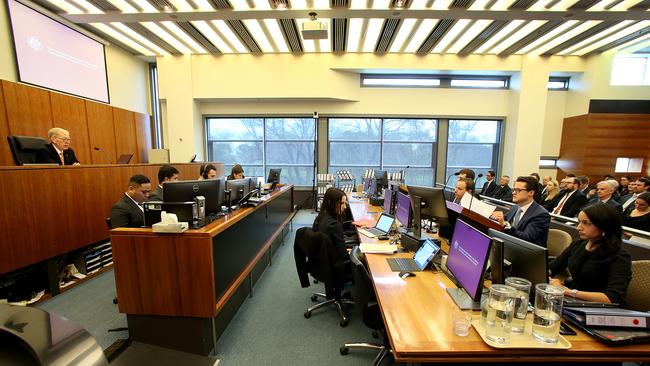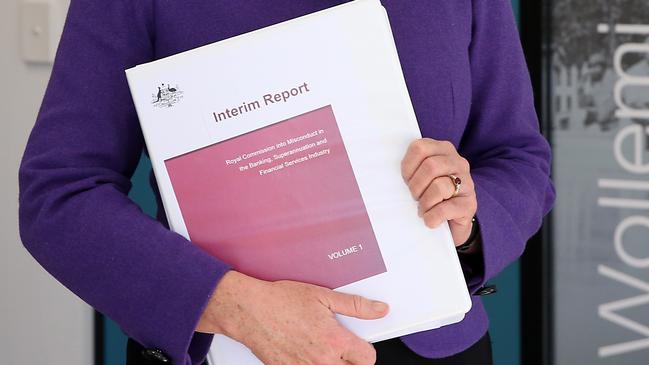Banking royal commission: Big banks admit to role of greed in response to Hayne’s interim report
The banks have admitted greed played a role in rip-offs revealed by the royal commission, while defending some practices.

Big banks have admitted greed played a role in rampant misconduct and rip-offs revealed by the financial services royal commission, while at the same time defending some of the practices criticised by Kenneth Hayne’s inquiry.
In submissions to Mr Hayne’s interim report that were released by the commission, the banks defended vertical integration, where the same institution makes and distributes a financial product, even though most are scrambling to offload their wealth management arms.
The banks also defended the corporate and prudential regulators, whose reluctance to prosecute them for misconduct was savaged by Mr Hayne and supported the use of enforceable undertakings instead of legal action.
And they largely defended the use of the Household Expenditure Measure as a benchmark to determine whether a loan was affordable, a practice that was also questioned by Mr Hayne.
They remained divided on whether lucrative trailing commissions to mortgage brokers should be banned.
But three of the big four — CBA, NAB and Westpac — said the new Banking Executive Accountability Regime, which is designed to hold bank executives responsible for banking misconduct, should be expanded to cover all entities regulated by the Australian Prudential Regulation Authority including insurance companies and super funds.
NAB chief executive Andrew Thorburn said the inquiry had been “a deeply confronting experience” that was both “upsetting and disappointing”.
“Regulation alone cannot achieve all the change that is required. As a bank, and as an industry, we need to listen, learn and respond with actions,” Mr Thorburn said in the bank’s submission.

“There has been a shift in the way we view our customers and our role, leaving our industry open to your challenge that we have put “profits before people”. We have failed to recognise that, ultimately, the interests of our shareholders are aligned with those of our customers in the sense that, if we get the customer experience right — if we serve our customers’ interests well — we will build a sustainable business for all stakeholders,“ he said.
Australia’s biggest bank, the Commonwealth, said that while it had not “actively” tried to disadvantage customers “a focus on profit and profitability has driven prioritisation and decisions that have had that effect”.
It defended the HEM as “an appropriate benchmark” and said bank “representatives should be permitted to recommend a financial product manufactured by a related entity”.
“To the extent that conflicts exist, the group is of the view that they can be managed effectively and do not require structural separation,” it said.
The bank said that while “the deterrent effect of litigation cannot be understated” regulators needed “enforcement flexibility”.
ANZ said that it focus on short-term goals including financial performance “too often came at the expense of longer term results, including customer outcomes and the reputation of the bank”.
It told Mr Hayne “structural change prohibiting related entities from providing financial advice and being involved in the manufacture of financial products is not necessary” and supported the use of enforceable undertakings as “time and cost efficient for regulators, while still having reputational consequences for the entity and acting as a deterrent to the financial services industry”.
It said it was reducing its reliance on the HEM to write loans but “a benchmark of some kind is likely to remain a part of future expense verification”.
Macquarie Group, which will make its first appearance before the commission in its final round of hearings this month, said any move away from the HEM should be synchronised with Open Banking reforms that will give banks more details about other accounts held by customers.
It supported vertical integration and said enforceable undertakings “can achieve effective regulatory outcomes and facilitate change more quickly and broadly within its business than may be the case had a litigation route been pursued first or in the alternative”.
The group said an EU it agreed to with ASIC following a financial planning scandal gave it an “opportunity … to reflect more broadly on the adequacy of its compliance arrangements and to implement lasting changes in a relatively short period of time”.
However, when the two-year EU ended in 2015, ASIC said “further work” was needed and appointed KPMG to do further monitoring for another year.
NAB said customers benefited from vertically integrated businesses and that conflicts could be “adequately managed”, but backed a move away from paying advisers based on the how many products they sold. It also blamed the increasing complexity in the law for its “unduly complex” internal compliance controls.
NAB said the banking executive accountability regime should be extended to all financial companies, in a position mirrored by Westpac, and that ASIC should be given a choice as to whether pursue breaches in the court or through other means.
Westpac said the HEM benchmark was a “valuable tool for lenders” and warned Mr Hayne against putting in place responses that would damage the financial system or the ability for customers to access services.
Westpac, which said there was nothing wrong with vertically integrated models as long as conflicts were managed, also defended paying executives based on profit targets, arguing that “financial targets for management can, if properly calibrated, be consistent with, and promote” good customer service.
The bank also said the responsibilities between APRA and ASIC should be made clearer.
AMP, which borrowed heavily from new chairman David Murray’s Financial System Inquiry report, hit out against further regulations, arguing that culture was “most effectively governed internally” and that simplifying the law should come before new legislation.
“Culture cannot be prescribed by legislation. No two organisations will have the same culture and so it is very difficult to prescribe what that should be,” AMP said.
AMP also dunked on the separation of conglomerates, and said “no recommendation should be made by the Commission which would limit an entity’s commercial flexibility to adopt a vertically integrated model”.
AMP also said it supported a transition away from grandfathered commissions, but raised concerns over a “constitutional” issue over property rights of financial advisers.
Consumer groups blasted banking’s culture of greed, with the Consumer Action Law Centre saying Mr Hayne’s inquiry had proved self-regulation a failure.
“We agree with the Commissioner’s conclusion that much of this misconduct has been driven by a culture of greed and the pursuit of profit over people,” it said.
Choice said that “across every sector of the financial services industry — from consumer lending to financial advice to insurance — banks and other entities have shown flagrant disregard for both the law and the needs of their customers.
“The pursuit of profit over all other things has been a leading cause of this misconduct.”





To join the conversation, please log in. Don't have an account? Register
Join the conversation, you are commenting as Logout